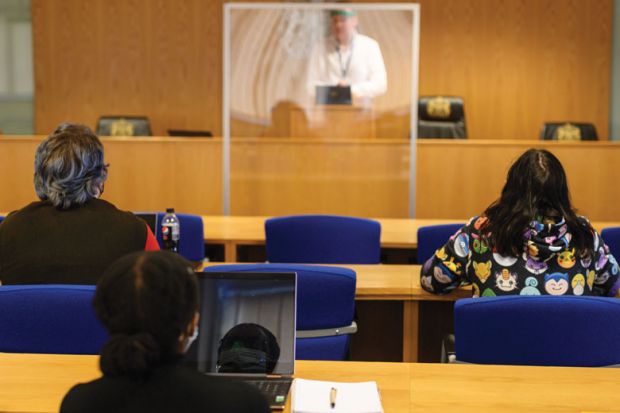Scientists have challenged the Westminster government’s claim that continuing face-to-face teaching is essential to protect student well-being, highlighting that while that might be true for tuition in normal times, the “Covid secure” equivalent may be less beneficial.
In a letter to vice-chancellors, universities minister Michelle Donelan justified demanding that in-person teaching should continue during England’s second coronavirus lockdown by warning that shifting wholly to online learning “could jeopardise the learning that students receive, as well as risk their mental health and well-being”.
But academics have questioned whether the benefits of face-to-face teaching outweigh the risks attached to it in the middle of a pandemic.
Elizabeth Stokoe, professor of social interaction at Loughborough University and a member of the Independent Sage group of scientists, said that there was “no evidence to support” Ms Donelan’s claim, while there is plenty to demonstrate that online learning can be highly effective.
Another Independent Sage member, John Drury, professor of social psychology at the University of Sussex, agreed. “Yes, groups and interaction are good for our and our students’ mental health. But the equation of ‘connection’ with in-person teaching, and hence in-person teaching with mental health, is speculative rather than evidence-based,” he said.
An “extremely large body of research” shows that people can often be psychologically more connected with their social groups online and that feeling part of a group is a cognitive process, he said, adding that students’ social networks were created largely via who they lived with rather than their classmates.
Students remaining on English campuses are receiving a limited amount of face-to-face tuition, which is typically socially distanced, conducted while wearing face coverings and may offer limited opportunities for group work. On-campus residents are locked down in “bubbles” in their accommodation.
Stephen Reicher, Bishop Wardlaw professor of social psychology at the University of St Andrews and another Independent Sage member, said that current restrictions limited the benefits of in-person learning.
“I have heard many people say that you get much more of a sense of connection with online platforms, where you see everyone’s face, as opposed to the back of their head or their mask,” he said.
Then there is the question of how many students want to attend in-person classes. Academics, including from the universities of Bristol and East London, have tweeted pictures of empty classrooms, stating that students had opted to tune in via Zoom instead.
Speaking last week at an event on the benefits of blended learning, Peter Mathieson, vice-chancellor of the University of Edinburgh, said that his university was providing face-to-face teaching across its courses, “but in quite a lot of those programmes attendance to those sessions is poor. Students are electing to come in remotely.”
Some students chose to return home prior to the start of lockdown, which banned such trips before Christmas.
However, Simon Wessely, professor of psychological medicine at King’s College London, warned that many students did not have access at home “to a desk in a quiet room, a pair of headphones if others are around, good broadband and so on”.
“The transition to online has disproportionately affected those students from less well-off backgrounds,” he said. “University is a time of learning, transition, maturity and independence…I think it is right that to say that in-person teaching is better for mental health than the opposite, and not just teaching, it is all aspects of what a university education provides.”
Professor Wessely added that “the current restrictions have already significantly impacted on all aspects of the purpose of a university. That makes it even more important we should do everything we can to keep whatever semblance we can of what a university provides alive.”
Register to continue
Why register?
- Registration is free and only takes a moment
- Once registered, you can read 3 articles a month
- Sign up for our newsletter
Subscribe
Or subscribe for unlimited access to:
- Unlimited access to news, views, insights & reviews
- Digital editions
- Digital access to THE’s university and college rankings analysis
Already registered or a current subscriber? Login








